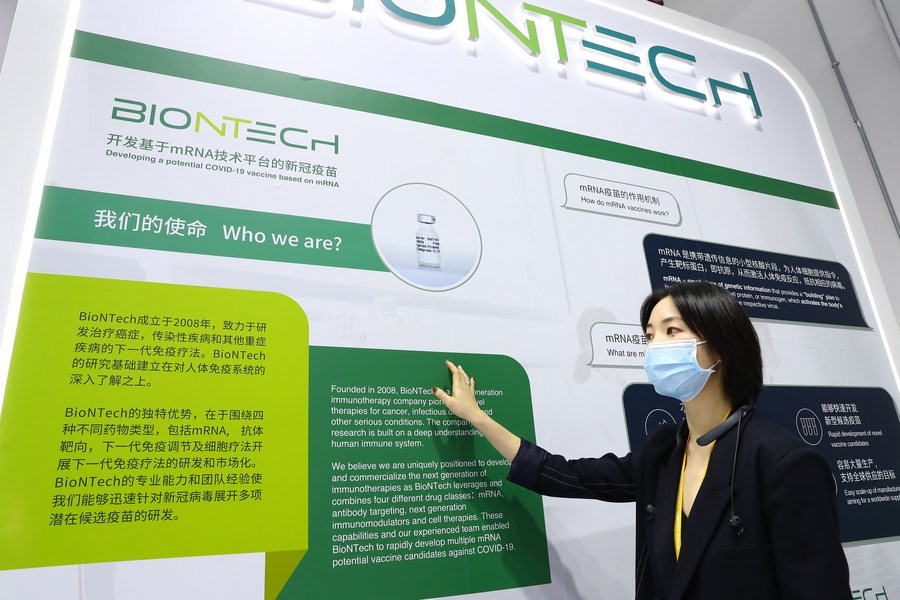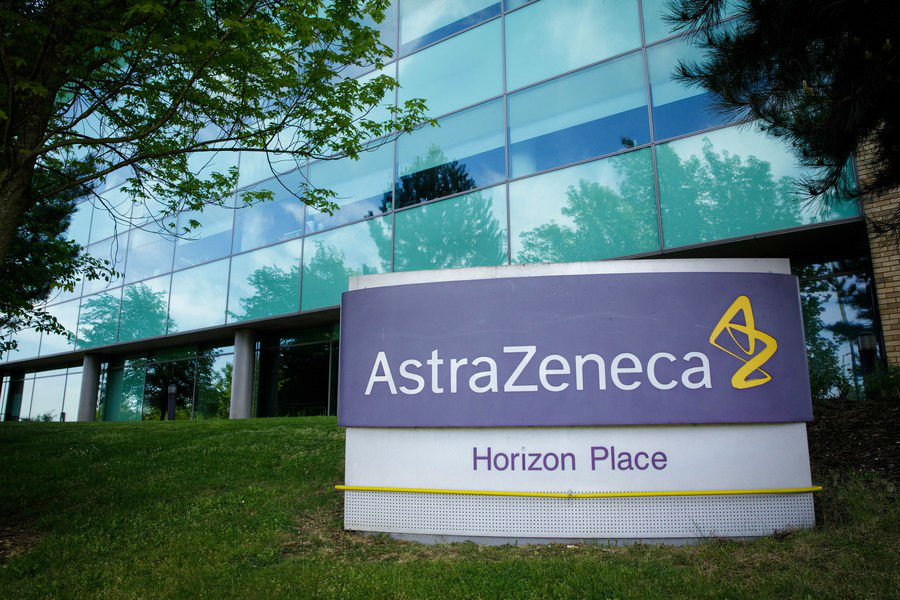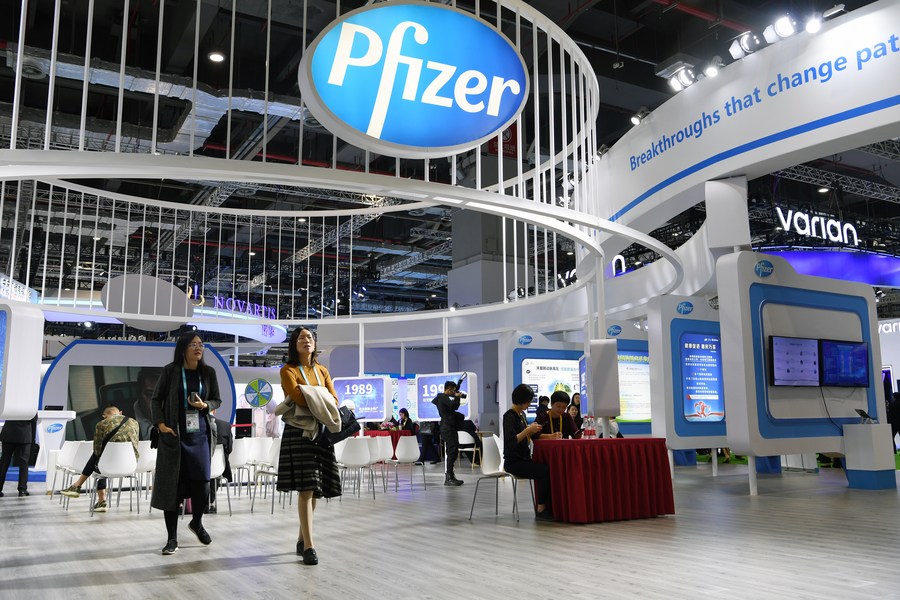


A staff member introduces a potential COVID-19 vaccine developed by BioNTech and Fosun Group at the Medical Equipment and Healthcare Products exhibition area during the third China International Import Expo (CIIE) in Shanghai, east China, Nov. 5, 2020. (Xinhua/Zhang Yuwei)
Globally, there are 163 COVID-19 candidate vaccines in preclinical evaluation and 51 others in clinical evaluation, according to a publication of the WHO.
The world's top scientists on the development of COVID-19 vaccines on Friday expressed optimism about and confidence in having affordable vaccines with equitable access to all despite challenges regarding funding, purchasing, distribution as well as information.
"I'm very optimistic and also confident that if we continue to mobilize everyone who is a stakeholder in vaccine development and distribution, we will make that happen," said Oezlem Tuereci, chief medical officer at the German vaccine developer BioNTech.
Scientifically and technologically it is possible to make COVID-19 vaccines a global public good, said Soumya Swaminathan, the World Health Organization (WHO) chief scientist.
"We are confident that we're going to have several candidates that are safe and effective," taking into account all the work that is going on and the many more vaccine candidates under development, said Swaminathan, who was speaking at a panel discussion of one special session of the United Nations General Assembly in response to the COVID-19 pandemic.
"We're in a very exciting stage now where we're seeing efficacy results coming out on the first vaccine licensure," said Sarah Gilbert, professor of vaccinology at Oxford University.

Photo taken on May 18, 2020 shows a logo in front of AstraZeneca's building in Luton, Britain. AstraZeneca, which is developing a possible vaccine against COVID-19 in partnership with the University of Oxford, on Wednesday put on hold the phase-3 trial of its vaccine following an unexplained illness in one trial participant in Britain. (Photo by Tim Ireland/Xinhua)
Still, the challenge is having world political leaders make it happen, said Swaminathan, citing a funding gap of 30 to 35 billion U.S. dollars for the Access to COVID-19 Tools (ACT) Accelerator, which is a global collaboration to accelerate the development, production, and equitable access to COVID-19 tests, treatments, and vaccines.
The funding gap is just 1 percent of the stimulus package countries are spending and it would result in something like 150 billion dollars' return to the top ten economies of the world if "we have vaccines for the world," said Swaminathan.
Having a vaccine is not an end in itself, said Sahin, noting that there are still a lot of challenges on how to distribute the vaccine from the logistic, technical and scientific perspectives.
On the distribution of COVID-19 vaccines, Tuereci said it "has to be cooperation in which organizations like the WHO or the United Nations have to take the lead."
As the milestone of having vaccines has been reached, the next key milestone is to find ways of equitable supply and distribution and up-scaling to global dimensions of all the vaccines with high efficacy, Tuereci said.
"What we need to do is to continue with the collaboration (with partners) because we need more vaccines," and also, there are other vaccines in advanced stages of development, said Gilbert.

Photo taken on Nov. 7, 2019 shows the booth of Pfizer Inc. during the second China International Import Expo (CIIE) in Shanghai, east China. (Xinhua/Fan Peishen)
"That's the way that we're going to get the most number of vaccines for the world. It is a very good thing if we have vaccines made in different ways because that will give us the largest number of doses," Gilbert said.
Swaminathan said she is very happy to see the efficacy of a few candidate vaccines exceeding 70 percent of the benchmark and many more vaccines in development would have results disclosed in the next few months.
Globally, there are 163 COVID-19 candidate vaccines in preclinical evaluation and 51 others in clinical evaluation, according to a publication of the WHO on Wednesday.
The COVID-19 Global Vaccine Access Facility, a global mechanism backed by the WHO, seeks to procure, equitably allocate and deliver 2 billion doses of safe and effective COVID-19 vaccines by the end of 2021.
Though pharmaceutical giants AstraZeneca and Pfizer aim to produce up to 3 billion and 1.3 billion doses of COVID-19 vaccines respectively in 2021, bilateral purchase agreements from rich countries have made vaccines supply to developing or small-sized companies an increasing concern.
"That's not an option. We have to achieve it and we can achieve it," said Ugur Sahin, chief executive officer with BioNTech.

 Award-winning photos show poverty reduction achievements in NE China's Jilin province
Award-winning photos show poverty reduction achievements in NE China's Jilin province People dance to greet advent of New Year in Ameiqituo Town, Guizhou
People dance to greet advent of New Year in Ameiqituo Town, Guizhou Fire brigade in Shanghai holds group wedding
Fire brigade in Shanghai holds group wedding Tourists enjoy ice sculptures in Datan Town, north China
Tourists enjoy ice sculptures in Datan Town, north China Sunset scenery of Dayan Pagoda in Xi'an
Sunset scenery of Dayan Pagoda in Xi'an Tourists have fun at scenic spot in Nanlong Town, NW China
Tourists have fun at scenic spot in Nanlong Town, NW China Harbin attracts tourists by making best use of ice in winter
Harbin attracts tourists by making best use of ice in winter In pics: FIS Alpine Ski Women's World Cup Slalom
In pics: FIS Alpine Ski Women's World Cup Slalom Black-necked cranes rest at reservoir in Lhunzhub County, Lhasa
Black-necked cranes rest at reservoir in Lhunzhub County, Lhasa China's FAST telescope will be available to foreign scientists in April
China's FAST telescope will be available to foreign scientists in April